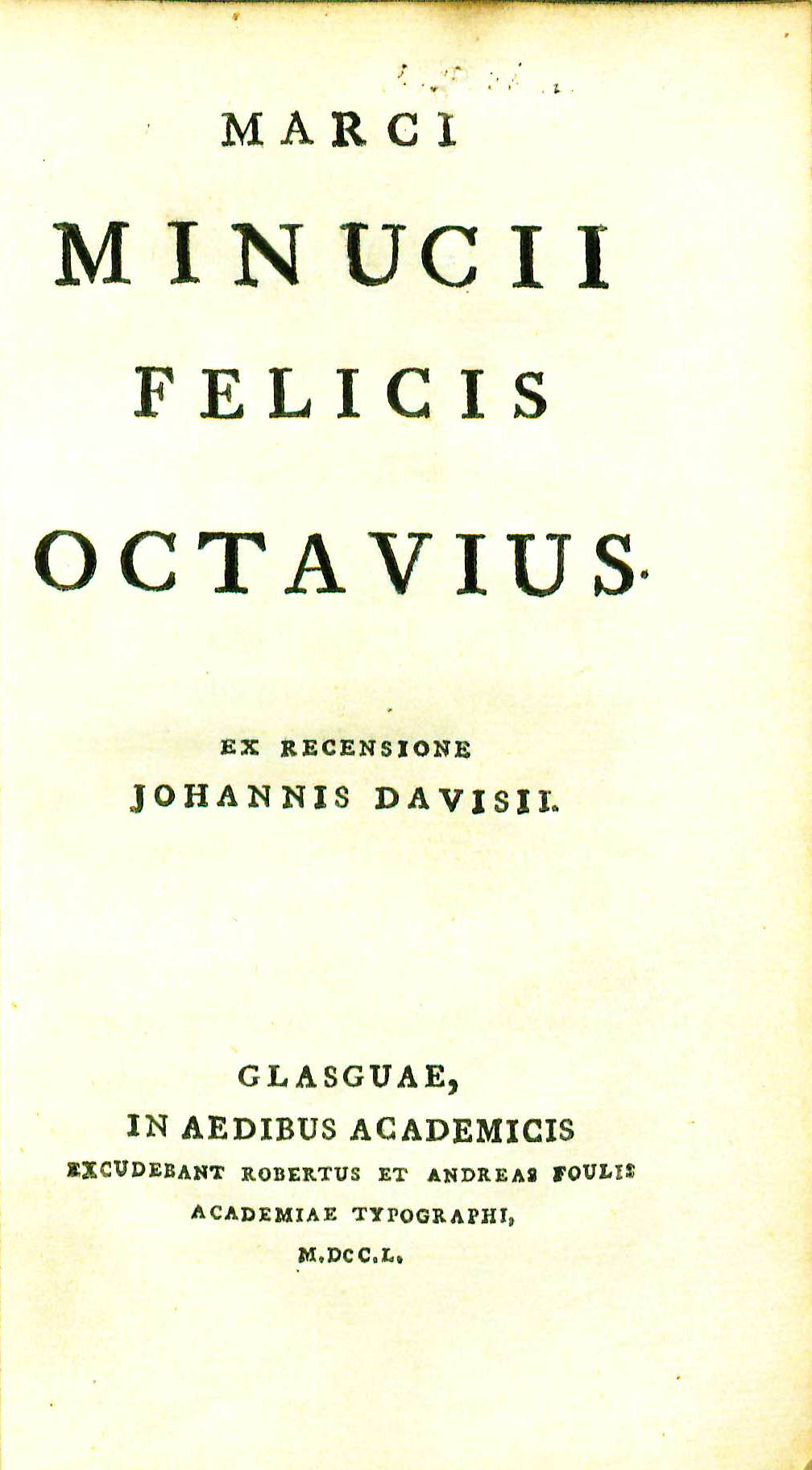Difference between revisions of "Marci Minucii Felicis Octavius"
Ammorris01 (talk | contribs) (→See also) |
Ammorris01 (talk | contribs) (→External Links) |
||
| Line 40: | Line 40: | ||
[[Category:George Wythe Collection at William & Mary's Wolf Law Library]] | [[Category:George Wythe Collection at William & Mary's Wolf Law Library]] | ||
| + | [[Category:Jefferson's Books]] | ||
[[Category:Religion]] | [[Category:Religion]] | ||
[[Category:Titles in Wythe's Library]] | [[Category:Titles in Wythe's Library]] | ||
Revision as of 17:26, 7 September 2015
by Marcus Minucius Felix
| Marci Minucii Felicis Octavius | |
|
Title page from Marci Minucii Felicis Octavius, George Wythe Collection, Wolf Law Library, College of William & Mary. | |
| Author | Marcus Minucius Felix |
| Editor | John Davies |
| Published | Glasguae: In aedibus academicis excudebant Robertus et Andreas Foulis |
| Date | 1750 |
| Language | Latin |
| Pages | [4], 112, [12] |
| Desc. | 8vo (16 cm.) |
| Location | Shelf A-4 |
Minucius Marcus Minucuis Felix (d. ca. 250 CE) was a Roman advocate, rhetorician, and Christian apologist. His only known work,[1] Octavius, one of the earliest Christian apologies in Latin. It is a dialogue between pagan Caecilius Natalis and a Christian, Octavius Januarius. We know little about the author, Marcus Minucuis Felix, other than that he was a lawyer and a Christian.[2]
Minucius is of interest not only to theologians and Church historians, but also to those with an interest in philosophy and rhetoric. Unlike other Latin apologists of the period, such as Tertullian, who asserted credo quia ineptum (I believe because [it is] absurd) (De Carne Christi 5.4), and who was openly hostile to speculative philosophy, Minucius attempted to establish at least the rational possibility of the Christian faith. The rhetoric found within the Octavius can be considered Ciceronian, having elements of the six-part speech (exordium, narration, partition, confirmation, refutation, and conclusion). This text represents an important stage in the evolution of rhetoric from a primarily oral, forensic, and political art, to a literary art.[3]
The edition in George Wythe’s collection was edited by John Davies (1679–1732), who was president of Queen’s College, Cambridge. He was close friends with the eminent classicist Richard Bentley, who contributed to many of Davies’s editions.[4]
Evidence for Inclusion in Wythe's Library
Listed in the Jefferson Inventory of Wythe's Library as "Minucii Felicis Octavius. 12mo. Foulis." This was one of the books kept by Thomas Jefferson. The Foulis Press printed only one title by Minucius, in 1755.[5] Jefferson owned two copies of this work. He sold one to the Library of Congress in 1815, but it no longer exists to establish Wythe's prior ownership.[6] The Brown Bibliography[7] mentions this copy and the one sold in 1829 after Jefferson's death, but Brown does not speculate about which copy previously belonged to Wythe. George Wythe's Library[8] on LibraryThing also includes the Foulis publication with the note "Not sold to Congress in 1815." The Wolf Law Library purchased a copy of the Foulis edition.
Description of the Wolf Law Library's copy
Bound in contemporary calf, rebacked. Board edges stamped and gilt. Purchased from Rosenlund Rare Books and Manuscripts.
View the record for this book in William & Mary's online catalog.
See also
References
- ↑ Internet Encyclopedia of Philosophy, s.v. "Minucius Felix (c. 2nd and 3rd C. CE)," accessed Oct. 8, 2013.
- ↑ Encyclopaedia Britannica Online, s.v. "Marcus Minucius Felix," accessed October 17, 2013.
- ↑ Internet Encyclopedia of Philosophy, s.v. "Minucius Felix."
- ↑ Thompson Cooper, "Davies, John (1679–1732)," rev. S. J. Skedd in Oxford Dictionary of National Biography (Oxford University Press, 2004- ), accessed October 17, 2013.
- ↑ Philip Gaskell, A Bibliography of the Foulis Press, 2nd ed. (Winchester, Hampshire, England: St Paul's Bibliographies, 1986), 145.
- ↑ E. Millicent Sowerby, Catalogue of the Library of Thomas Jefferson 2nd ed. (Charlottesville: University Press of Virginia, 1983), 2:42 [no.1332].
- ↑ Bennie Brown, "The Library of George Wythe of Williamsburg and Richmond," (unpublished manuscript, May, 2012) Microsoft Word file. Earlier edition available at: https://digitalarchive.wm.edu/handle/10288/13433
- ↑ LibraryThing, s.v. "Member: George Wythe," accessed March 4, 2014.
External Links
Read this book in Google Books.
